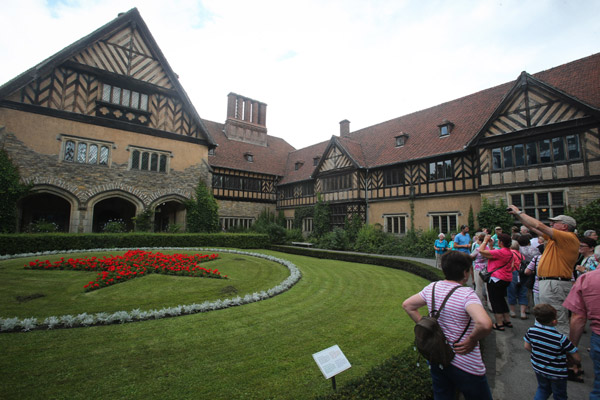'Respect for the historical truth' - a visit to Cecilienhof Palace as world commemorates 70th anniversary of Potsdam Proclamation
(Xinhua) Updated: 2015-07-26 18:17
 |
|
Tourists visit the Cecilienhof Palace in Potsdam, capital of Germany's Brandenburg state, where the Potsdam Proclamation was issued in 1945. [Photo/Xinhua] |
BERLIN - "Now you are entering the conference hall. The roundtable placed in the center is the original one used during the Potsdam Conference," a docent told visitors in the Cecilienhof Palace in Potsdam, a city situated to the southwest of the German capital of Berlin.
The Cecilienhof Palace, located in a large park, close to a lake shore, is known for being the location of the Potsdam Conference, which was held in July and August 1945.
On July 26, 1945, China, the United States and Britain jointly issued the Potsdam Proclamation, a document that has an important significance to the establishment of the international order after the end of the Second World War. The statement demanded Japan's unconditional surrender to the Allies at the end of the war, in the wake of its wartime aggression.
The Cecilienhof Palace, a former residency of Germany's last crown prince, has now become an memorial of the Potsdam Conference.
As the interior furnishings of the working rooms used for the conference are largely unchanged, a walk in the palace would make visitors feel like a time-travel to 70 years ago. Most noticeable is the conference hall located in the central area of the palace, with the famous roundtable gathering the "Big Three" heads of state -- Soviet leader Joseph Stalin, American President Harry S. Truman and British Prime Minister Winston Churchill.
In addition to displaying original objects, the Cecilienhof Palace also features a permanent exhibition with texts, pictures, videos and other historical materials introducing the Second World War and the Potsdam Conference.
A section presenting Japan's defeat in the war says: "Despite the threat of 'prompt and utter destruction', Japan refused to capitulate... The Japanese government ignored the Potsdam Proclamation... The Americans responded by dropping its A-bombs over Hiroshima and Nagasaki."
The Potsdam Proclamation outlined the terms for Japan's unconditional surrender. According to the document, the terms of the 1943 Cairo Declaration setting goals for the post-war order "shall be carried out and Japanese sovereignty shall be limited to the Islands of Honshu, Hokkaido, Kyushu, Shikoku and such minor islands as we (the Allied leaders) determine."
"There must be eliminated for all time the authority and influence of those who have deceived and misled the people of Japan into embarking on world conquest," the declaration also said.
Japan declared its acceptance of the provisions of the Potsdam Proclamation on Aug. 14, 1945, and signed the Instrument of Surrender on Sept. 2.
The Potsdam Proclamation and other documents issued during the Potsdam Conference are considered as important achievements of the victory over fascism in World War II. To mark the 70th anniversary of the Potsdam Conference, a series of special events are scheduled to be held in the Cecilienhof Palace from this July to September this year.
During a lecture under the theme "The Potsdam Conference and the war in the Pacific", a German writer will introduce Japan's war of aggression to the public, starting from Japan's invasion of northeast China in September 1931 through to the dropping of atomic bombs on Japan in August 1945 as a response to the country' s ignorance of the Potsdam Proclamation.
"The Potsdam Conference is a turning point in the history of the 20th century. The Cecilienhof Palace is an event location not only for the European post-war history, but for the world politics in general," Frank Kallensee, press spokesman of the Cecilienhof Palace, told Xinhua in an interview.
Kallensee noted the significance of holding exhibitions and commemorative activities to mark the Potsdam Conference at the authentic location of the event, saying they help people, particularly younger generations, understand the meaning of the Potsdam Conference and the post-war world order established by the conference.
Decades after the end of the historic event, the Cecilienhof Palace is still attracting visitors from around the world. "Justice will ultimately prevail over evil... A tribute to the heroes of World War II," wrote some visitors in the Palace's guestbook.
"As we can see, the original furnishings of the rooms used for the Potsdam Conference are well preserved. It shows a respect for the history. I think we should also take the same attitude when it comes to the historical truth," German visitor Klein told Xinhua.
- Potsdam Proclamation vital to world order, peace: scholars
- Commemorating Potsdam Proclamation is of great realistic significance
- Japan urged to obey rules under Potsdam Proclamation
- Japan 'violating' the Potsdam Declaration
- Abe's denial of Potsdam Proclamation no good for Japan's image
- July 26, 1945: China, the United States and Britain issue the Potsdam Proclamation




